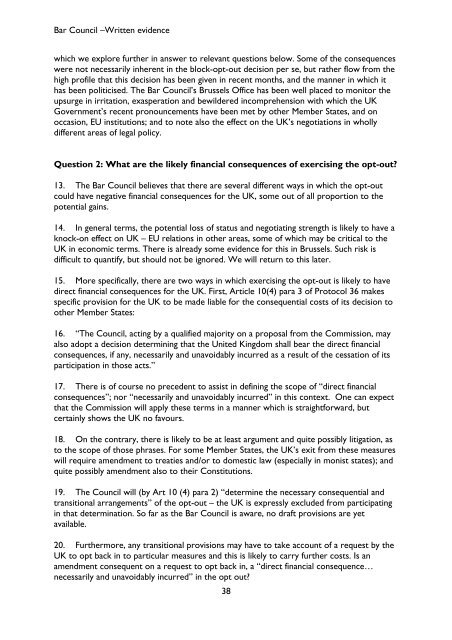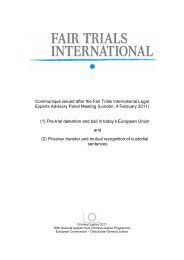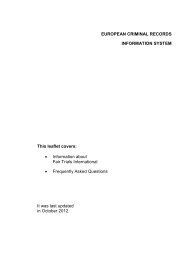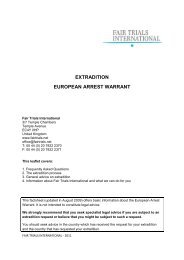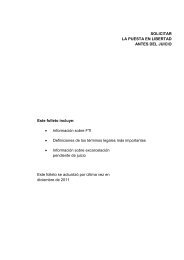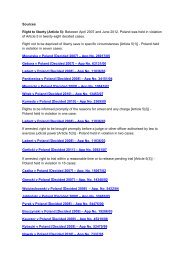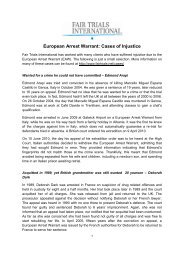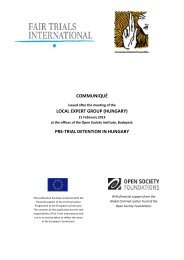The Association of Chief Police Officers - Parliament
The Association of Chief Police Officers - Parliament
The Association of Chief Police Officers - Parliament
Create successful ePaper yourself
Turn your PDF publications into a flip-book with our unique Google optimized e-Paper software.
Bar Council –Written evidencewhich we explore further in answer to relevant questions below. Some <strong>of</strong> the consequenceswere not necessarily inherent in the block-opt-out decision per se, but rather flow from thehigh pr<strong>of</strong>ile that this decision has been given in recent months, and the manner in which ithas been politicised. <strong>The</strong> Bar Council’s Brussels Office has been well placed to monitor theupsurge in irritation, exasperation and bewildered incomprehension with which the UKGovernment’s recent pronouncements have been met by other Member States, and onoccasion, EU institutions; and to note also the effect on the UK’s negotiations in whollydifferent areas <strong>of</strong> legal policy.Question 2: What are the likely financial consequences <strong>of</strong> exercising the opt-out?13. <strong>The</strong> Bar Council believes that there are several different ways in which the opt-outcould have negative financial consequences for the UK, some out <strong>of</strong> all proportion to thepotential gains.14. In general terms, the potential loss <strong>of</strong> status and negotiating strength is likely to have aknock-on effect on UK – EU relations in other areas, some <strong>of</strong> which may be critical to theUK in economic terms. <strong>The</strong>re is already some evidence for this in Brussels. Such risk isdifficult to quantify, but should not be ignored. We will return to this later.15. More specifically, there are two ways in which exercising the opt-out is likely to havedirect financial consequences for the UK. First, Article 10(4) para 3 <strong>of</strong> Protocol 36 makesspecific provision for the UK to be made liable for the consequential costs <strong>of</strong> its decision toother Member States:16. “<strong>The</strong> Council, acting by a qualified majority on a proposal from the Commission, mayalso adopt a decision determining that the United Kingdom shall bear the direct financialconsequences, if any, necessarily and unavoidably incurred as a result <strong>of</strong> the cessation <strong>of</strong> itsparticipation in those acts.”17. <strong>The</strong>re is <strong>of</strong> course no precedent to assist in defining the scope <strong>of</strong> “direct financialconsequences”; nor “necessarily and unavoidably incurred” in this context. One can expectthat the Commission will apply these terms in a manner which is straightforward, butcertainly shows the UK no favours.18. On the contrary, there is likely to be at least argument and quite possibly litigation, asto the scope <strong>of</strong> those phrases. For some Member States, the UK’s exit from these measureswill require amendment to treaties and/or to domestic law (especially in monist states); andquite possibly amendment also to their Constitutions.19. <strong>The</strong> Council will (by Art 10 (4) para 2) “determine the necessary consequential andtransitional arrangements” <strong>of</strong> the opt-out – the UK is expressly excluded from participatingin that determination. So far as the Bar Council is aware, no draft provisions are yetavailable.20. Furthermore, any transitional provisions may have to take account <strong>of</strong> a request by theUK to opt back in to particular measures and this is likely to carry further costs. Is anamendment consequent on a request to opt back in, a “direct financial consequence…necessarily and unavoidably incurred” in the opt out?38


